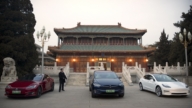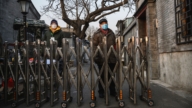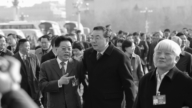【新唐人2012年7月11日訊】中共公安部近期對1400名各地新上任的公安局長進行分批培訓,處理「烏坎事件」的廣東省委副書記兼政法委書記朱明國在培訓上講課。分析指出,最近大陸群體事件比以往更加頻繁,形勢比以往更加嚴峻,包括什邡、廣東中山和天津大火的群眾抗議規模加大,參與人群出現90後學生,再加上18大召開在即,「維穩」成為中共的當務之急。而中共公安局長集訓,學習所謂的烏坎模式,只是取得暫時穩定的一個幌子,目地仍是維護中共的專制政權。
中共公安部於6月26號至7月31號,分3期輪流訓練1400名新上任的市、縣兩級公安局長,課程包括穩定形勢分析、應對網路輿論、群體性事件處置等。
授課者包括9位公安部及相關部委領導,以及十多位全國知名國際政治、宏觀經濟、司法行政專家,廣東省委副書記兼政法委書記朱明國也有份授課。
朱明國5月28號到烏坎村時,曾指示要建成「全省新農村的優秀典型」,並要向全國先進的目標看齊。3月中共「兩會」上,廣東省委書記汪洋也曾說,要以烏坎取得的經驗教訓用來指導全省村級組織工作。
日前朱明國到北京拜訪中共政法委8名高層,他們都讚賞廣東做法「有創意」、「走在全國前列」等。
原「山東大學」教授孫文廣指出,全中國抗議潮風起雲湧,各種大規模維權運動不斷,中共一味的鎮壓,即使學習甚麼模式,也得不到穩定。
原「山東大學」教授孫文廣:「中共當局當然它希望穩定,穩定壓倒一切,那麼它現在就召集起來開會,要求拿出樣板來,或者拿出學習的榜樣來,單單拿出一個烏坎來學習這是不夠的,等大家鬧起事來,那麼就讓一步,或者妥協一下,取得暫時的穩定,以後再想辦法呢,還是按照老一套的路走。」
時事評論員朱建國指出,學習所謂的烏坎模式只是幌子。
朱建國:「最近什邡,廣東的中山包括天津的大火,群體事件比以往更加頻繁,規模更加大了,而且參與的人群也出現了一些90後的中學生,所以這個形式比以往更加嚴峻,這是一個背景,另一個背景就是十八大的召開更加接近了,那麼這個維穩的任務所以他們也就覺得更加緊迫了。」
時政評論專家伍凡指出,不管中共當局採取甚麼措施,目地還是加強打壓,維護中共專制政權。
時政評論家伍凡:「它要根據目前的社會狀況,它們制定一些新的維穩政策、方針、辦法,其中目地就是維護這個政權,不管它採取任何措施,這一點不變,那麼在中共政權和老百姓之間的矛盾無法解決的時候,那這些公安局長就起了一個打手的作用,狼狗的作用,咬人,打人,這是他們開會的基本目標。」
另外,十八大前,各省黨委換屆結束,各地政法委書記不再兼任公安局長﹔而省級公安廳長多由外地調入,並兼任政府副職,同時,民間要求取消政法委的呼聲也日益高漲。
分析認為,這意味著公安不能再凌駕於法院和檢察院之上。
孫文廣指出,中共當局想求真正的穩定,就必須公安機關能夠依法行事,維持好社會的秩序,對民眾的示威遊行不再一味的血腥鎮壓,讓民意有一個表達的渠道。
採訪/劉惠 編輯/李韻 後製/薛莉
Public Security Trains For Mass Discontent
China’s Ministry of Public Security is conducting training
of the 1,400 new Public Security Bureau leaders.
Deputy secretary of Guangdong Provincial Committee and
Chief Politics and Law Committee secretary Zhu Mingguo, who handled the “Wukan” event, gave lectures at the training.
Analysts pointed out those mass incidents are happening
more frequently than in the past,
and the situation is more tense than before,
with the mass incidents in Shifang, Zhongshan and Tianjin, where young people born in the 90s also participated.
With the Chinese Communist Party (CCP)’s 18th Congress
around the corner, stability is becoming a top priority.
The training of the CCP public security bureau leaders
to learn from the so-called ‘Wukan model’ is just to obtain a temporary stability under disguise.
The real purpose is to maintain the CCP’s
autocratic regime in power.
CCP’s Ministry of Public Security is conducting
three training sessions from June 26 to July 31.
Its purpose is to train the 1,400 new public security
bureau leaders of city and county levels.
Classes include analyses of what a stable situation is,
handling of internet’s pubic opinion and mass incidents, etc.
Instructors include nine leaders from the
Ministry of Public Security and relevant ministries,
plus a dozen of well-known experts in international politics,
macroeconomics, and judicial administration.
Deputy secretary of Guangdong Provincial Committee and
CCP’ secretary of the Political and Legislative Affairs Committee (PLAC) Zhu Mingguo also gave lectures.
When Zhu arrived at Wukan on May 28, he ordered
to establish an “All New Village Model in the Province.”
During the CCP’s Two Sessions in March, the secretary
of Guangdong Province Wang Yang addressed the issue too.
Wang advised to use the experiences gained in Wukan
to direct village works in the whole province.
Recently Zhu Mingguo visited eight high-level officials
of the PLAC, who praised Guangdong as “creative and ahead of other areas.”
Former Shandong University professor Sun Wenguang
said, with the tide of protest and mass incidents across China,
the CCP’s blind repression will not lead to stability,
no matter what model it uses.
Sun Wenguang: “The CCP authorities want stability,
overriding everything else.
It is gathering people to meet and trying to set up models.
The Wukan model is not enough.
It simply steps back or gives in a little during mass incidents
to figure out the next step. It is the same old way.”
Commentator Zhu Jiaguo points out that learning
from the so-called Wukan model is merely a show.
Zhu Jianguo: “With the recent incidents in Shifang,
Guangdong, Zhongshan and the fire in Tianjin,
mass incidents happen more frequently than before, they are
on a larger scale and include young people from the 1990’s.
So the situation is more serious than ever before.
Also, with the CCP’s 18th Congress coming up,
the CCP feels more urgent to maintain stability.”
Commentator Wu Fan pointed out, no matter what methods
the CCP uses, its goal is to suppress and maintain the power.
Wu Fan: “It creates new policies, principles and methods
to maintain its power, based on the current social situation.
No matter what policies it adopts, its goal does not change.
Where there are conflicts between CCP’s regime and people,
public security bureau leaders serve as CCP’s hatchet men.
Hurting and beating are their basic objectives for
this meeting."
In addition, CCP leadership transition will finish
before the 18th CCP Congress.
Party secretaries of PLAC will no longer be
the leaders of public security bureaus.
Provincial public security bureau leaders are mostly from
other areas and act as deputy leaders in the government.
At the same time, calls to terminate the PLAC
are getting louder.
Analysts think this means public security
can no longer be above court and Procuratorate.
Sun Wenguang pointed out, if the CCP authorities want
true stability, the public security bureaus must follow the law to maintain the social order;
it must stop the bloody suppression of people’s protests,
and allow people to express themselves freely.


























